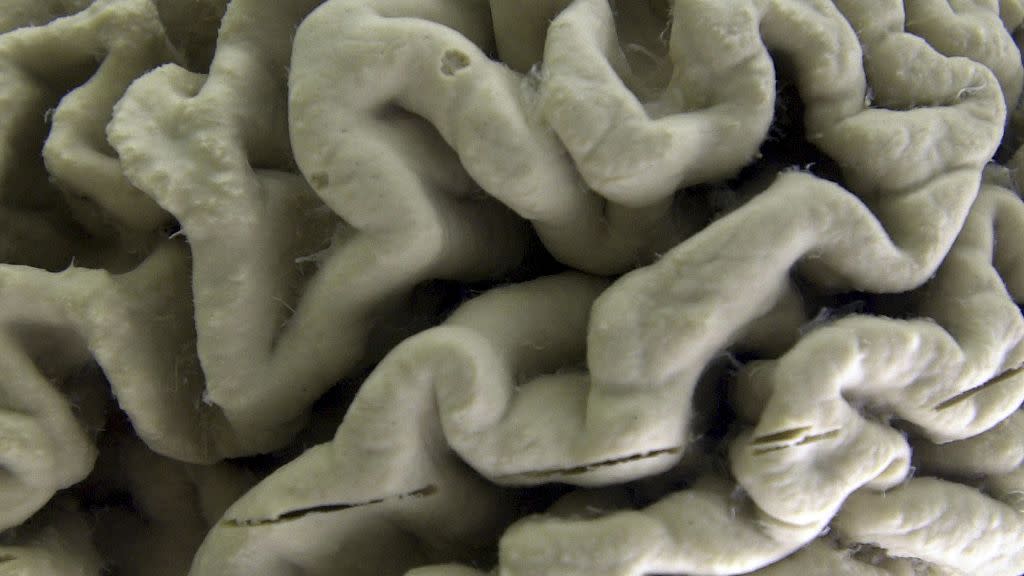Study finds possible 'distinct genetic form' of Alzheimer's disease

Researchers have found that people who have two copies of a specific gene almost all develop signs of Alzheimer's disease, which could represent a distinct genetic form of the condition.
While scientists knew the gene APOE4 was linked to an increased risk for Alzheimer's, a new study suggests that for people carrying two copies of the gene, it's an underlying cause of it.
Published in Nature Medicine, the study also found that individuals with two copies of the gene develop the disease earlier than people with other variants of the APOE gene.
Alzheimer’s disease is the most common form of dementia and impacts an estimated 7.8 million people in the European Union. Its hallmark symptoms include a decline in memory function and thinking skills.
The findings mark a distinction with “profound implications,” said Dr Juan Fortea, lead author of the study from the Sant Pau Research Institute in Barcelona, Spain.
An estimated 15 per cent of Alzheimer’s patients carry two copies of the gene, meaning those cases “can be tracked back to a cause and the cause is in the genes,” Fortea said.
"This gene has been known for over 30 years and it was known to be associated with a higher risk of developing Alzheimer's disease," he added in a statement.
"But now we know that virtually all individuals with this duplicated gene develop Alzheimer's biology. This is important because they represent between 2 and 3 per cent of the population".
Scientists say the findings mean it is critical to develop treatments that target the APOE4 gene.
How are genetics related to Alzheimer's?
A handful of genes are known to cause rare “early-onset” forms of Alzheimer's, mutations passed through families that trigger symptoms unusually young, such as by age 50. Some cases also are linked to Down syndrome.
But Alzheimer’s most commonly strikes after 65, especially in the late 70s to 80s, and the APOE gene, which also affects how the body handles fats, was long known to play some role.
There are three main varieties. Most people carry the APOE3 variant that appears to neither increase nor decrease Alzheimer’s risk. Some carry APOE2, which provides some protection against Alzheimer’s.
APOE4 has long been labelled the biggest genetic risk factor for late-in-life Alzheimer’s, with two copies risker than one.
'Familial form of Alzheimer's'
Fortea's team used data from 3,297 brains donated for research and from over 10,000 people in US and European Alzheimer’s studies.
They examined symptoms and early hallmarks of Alzheimer’s such as sticky amyloid in the brain.
People with two APOE4 copies were accumulating more amyloid at age 55 than those with just one copy or the “neutral” APOE3 gene variety, they said in the study.
By age 65, brain scans showed significant plaque buildup in nearly three-quarters of those double carriers, who also were more likely to have initial Alzheimer’s symptoms around that age rather than in the 70s or 80s.
Fortea said the disease's underlying biology was remarkably similar to young inherited types.
It appears more like “a familial form of Alzheimer’s,” said Dr Eliezer Masliah of the National Institute on Aging. “It is not just a risk factor".
Masliah said other research aims to develop gene therapy or drugs to specifically target APOE4.
He said it's also crucial to understand APOE4’s effects in diverse populations since it’s been studied mostly in white people of European ancestry.
But study co-author Dr Reisa Sperling, at Harvard-affiliated Brigham and Women’s Hospital in Boston, said the news doesn't mean people should race for a gene test.
"It’s important not to scare everyone who has a family history" of Alzheimer’s because this gene duo isn’t behind most cases, she told The Associated Press.

 Yahoo News
Yahoo News 
